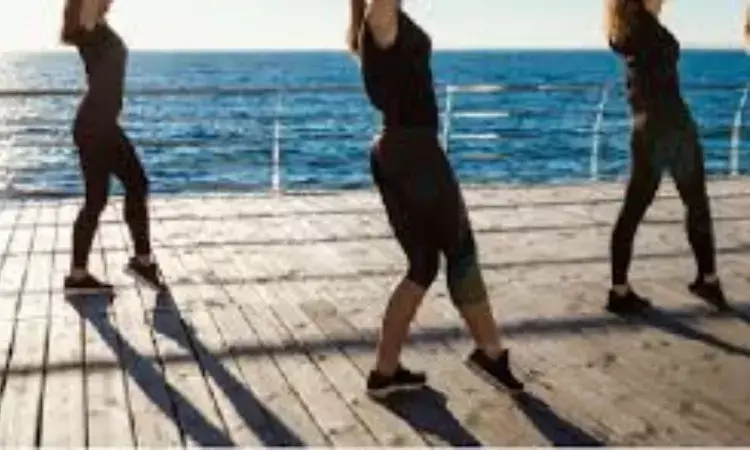- Home
- Medical news & Guidelines
- Anesthesiology
- Cardiology and CTVS
- Critical Care
- Dentistry
- Dermatology
- Diabetes and Endocrinology
- ENT
- Gastroenterology
- Medicine
- Nephrology
- Neurology
- Obstretics-Gynaecology
- Oncology
- Ophthalmology
- Orthopaedics
- Pediatrics-Neonatology
- Psychiatry
- Pulmonology
- Radiology
- Surgery
- Urology
- Laboratory Medicine
- Diet
- Nursing
- Paramedical
- Physiotherapy
- Health news
- Fact Check
- Bone Health Fact Check
- Brain Health Fact Check
- Cancer Related Fact Check
- Child Care Fact Check
- Dental and oral health fact check
- Diabetes and metabolic health fact check
- Diet and Nutrition Fact Check
- Eye and ENT Care Fact Check
- Fitness fact check
- Gut health fact check
- Heart health fact check
- Kidney health fact check
- Medical education fact check
- Men's health fact check
- Respiratory fact check
- Skin and hair care fact check
- Vaccine and Immunization fact check
- Women's health fact check
- AYUSH
- State News
- Andaman and Nicobar Islands
- Andhra Pradesh
- Arunachal Pradesh
- Assam
- Bihar
- Chandigarh
- Chattisgarh
- Dadra and Nagar Haveli
- Daman and Diu
- Delhi
- Goa
- Gujarat
- Haryana
- Himachal Pradesh
- Jammu & Kashmir
- Jharkhand
- Karnataka
- Kerala
- Ladakh
- Lakshadweep
- Madhya Pradesh
- Maharashtra
- Manipur
- Meghalaya
- Mizoram
- Nagaland
- Odisha
- Puducherry
- Punjab
- Rajasthan
- Sikkim
- Tamil Nadu
- Telangana
- Tripura
- Uttar Pradesh
- Uttrakhand
- West Bengal
- Medical Education
- Industry
Novel dance intervention improves cardiorespiratory fitness in young Indian girls: Study

India: Researchers from India have developed a novel dance/fitness intervention termed THANDAV (Taking High-Intensity Interval Training [HIIT] ANd Dance to Adolescents for Victory over non-communicable diseases [NCDs]). In the study, published in the journal Diabetes Technology & Therapeutics, Ranjit Mohan Anjana, ICMR Centre for Advanced Research on Diabetes, Chennai, India, and the team evaluated the THANDAV protocol among Asian Indian girls aged 10 to 17 years.
They found that THANDAV is a novel, culturally appropriate type of physical activity that takes little time, is enjoyable, and can be done at home. It may be a sustainable strategy to improve cardiorespiratory fitness and prevent NCDs in Asian Indian young girls.
THANDAV comprised of a 10-min routine with high- and low-intensity dance steps that were taught to 23 adolescent girls. The researchers then recorded their energy expenditure, heart rate (HR), blood pressure (BP), and body mass index (BMI). Following the completion of quantitative measurements, focused group discussions (FGDs) were conducted.
The average age of the girls was 13.9 ± 2.1 years, and the mean BMI and BP were 19.8 ± 3.3 kg/m2 and 107/68 (±8/7) mm/Hg, respectively.
Based on the study, the researchers found the following:
- All participants achieved 80% of their maximum HR during the first dance and managed to sustain this HR throughout the 10-min routine.
- There was a significant increase in the HR (bpm) [88.7 ± 8.4 to 195.6 ± 11.8] and VO2 (L/min) [0.025 ± 0.0 to 0.395 ± 0.1] postintervention.
- The average energy cost of the activity (metabolic equivalent) was 6.3. The FGDs revealed that THANDAV was a socially acceptable, fun, and energetic form of PA.
The researchers concluded, "The physical activity intervention tested in this study was novel, culturally appropriate, rigorous, and maybe a sustainable strategy to improve cardiorespiratory fitness among young females."
Reference:
Ranjit Mohan Anjana, Sharma Nitika, Srishti Sinha, Rebecca Kuriyan, Rajendra Pradeepa, Colin Palmer, Anura V. Kurpad, Viswanathan Mohan, Jim Sallis, and Harish Ranjani.Diabetes Technology & Therapeutics.Sep 2021.623-631.http://doi.org/10.1089/dia.2021.0028
Dr Kamal Kant Kohli-MBBS, DTCD- a chest specialist with more than 30 years of practice and a flair for writing clinical articles, Dr Kamal Kant Kohli joined Medical Dialogues as a Chief Editor of Medical News. Besides writing articles, as an editor, he proofreads and verifies all the medical content published on Medical Dialogues including those coming from journals, studies,medical conferences,guidelines etc. Email: drkohli@medicaldialogues.in. Contact no. 011-43720751


